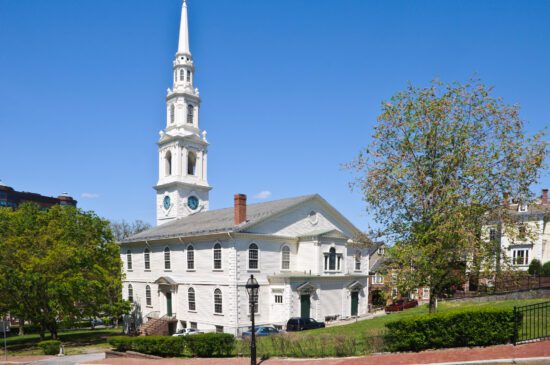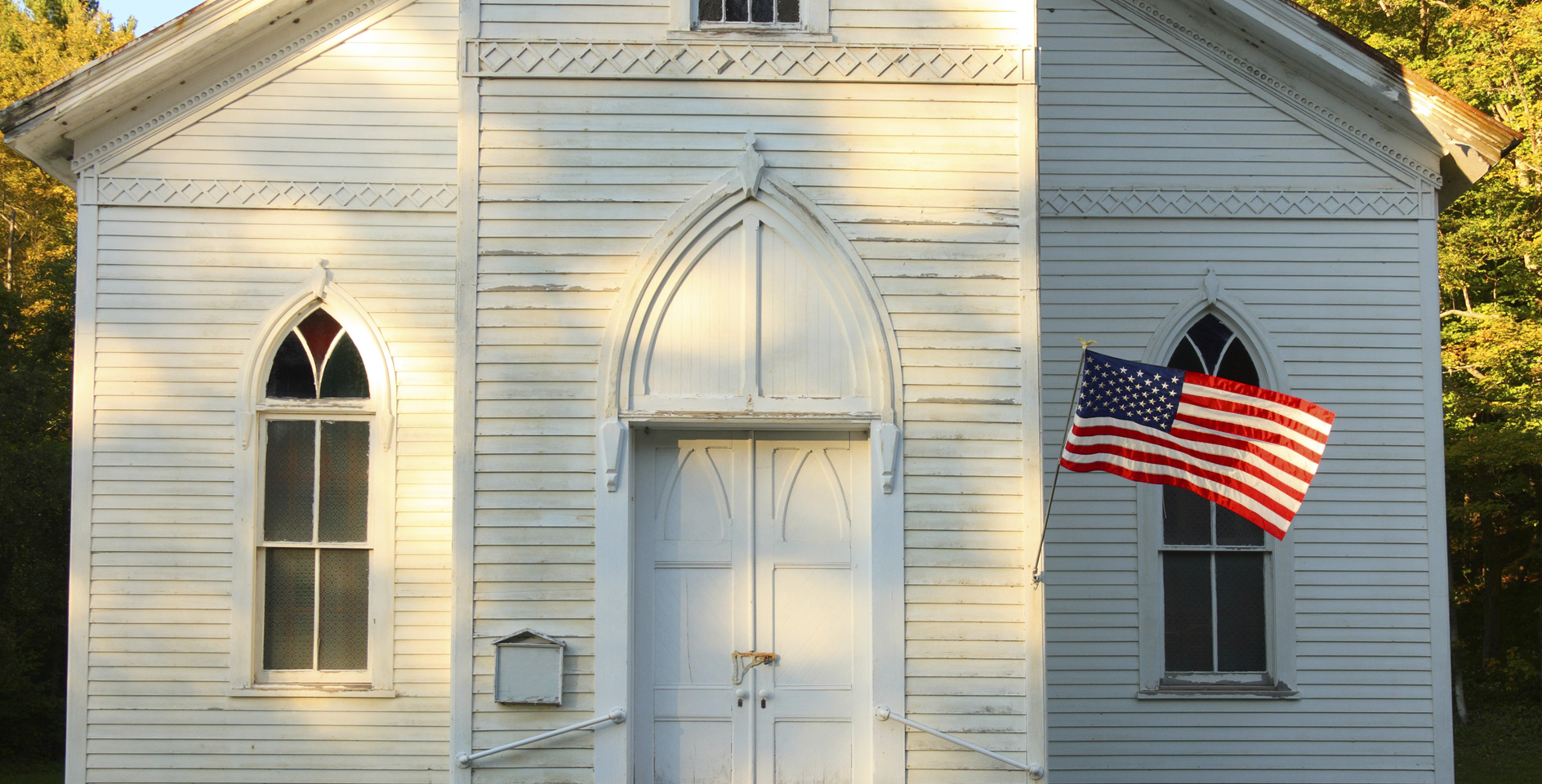In Phil 2:9-11, the apostle Paul wrote, “Therefore God has highly exalted him and bestowed on him the name that is above every name, so that at the name of Jesus every knee should bow, in heaven and on earth and under the earth, and every tongue confess that Jesus Christ is Lord, to the glory of God the Father.” This confession of Jesus’ lordship, according to Rom 10:9, was at the very heart of the Christian faith. When the New Testament church declared Jesus as Lord, they were declaring not only the community’s submission to Jesus, but the need for the whole world to acknowledge him as such. This confession was the same good news that Jesus preached when he announced the nearness of the Kingdom of God. Thus, such a confession was not merely a matter of personal belief but also, as Lesslie Newbigin would say, “a public truth.” Such an all-encompassing claim of lordship would have immediately put Christians at odds with similar competing claims.
So one must ask: How did an inherently exclusivistic religious minority that claimed to follow the resurrected and reigning Lord of the universe live and thrive in a pluralistic society that espoused almost diametrically opposed values? It would seem that the answer is found in the Jn 18:36, where Jesus declared, “My kingdom is not of this world.” Or maybe the answer can be traced to the apostle Paul, who in Eph 6:12, wrote, “For we do not wrestle against flesh and blood, but against the rulers, against the authorities, against the cosmic powers over this present darkness, against the spiritual forces of evil in the heavenly places.” According to these passages, it would seem that Christians were able to pray for God’s kingdom to come while honoring the Emperor of the Roman Empire, because they saw a fundamental difference between Jesus’ kingdom and Caesar’s. Yet, history reveals that professing Christians have not always understood the difference between these kingdoms. One does not have to look too hard throughout Christian history for what Peter Leithart calls “Constantinian moments.” According to Leithart, these moments are defined as “a merger of church and empire in which Christians identify some nation or empire or rule with the movement of God in history.” While the extent of such moments will continue to be debated, the reality of their presence reveals an inclination among professing Christians to forget the nature of the kingdom of Christ, especially in regards to church-state relations. Such an inclination means that Christians need to revisit the subject of the kingdom of Christ frequently and carefully consider the implications of its nature for church-state relationships, lest the pendulum endlessly swing back and forth between “Constantinian moments” and “Benedictine options.” A “more excellent way” exists for navigating the church-state relationship in light of the kingdom of Christ.
There was a time when evangelicals banded together with other likeminded groups to form a “moral majority.” Yet, those days have passed, and an ironically intolerant, relativistic pluralism has taken root within the United States. From the nationwide legalization of same-sex marriage to the attacks on religious liberty, the world within which evangelicalism once thrived has changed at blinding speeds. In the midst of such changes, there is a danger of evangelicals becoming motivated primarily by self-preservation in their religious liberty advocacy efforts. The tendency will be to fight for their place at the table and view competing ideologies as a threat to be silenced or suppressed. Yet, such motivations fail to understand the nature of the kingdom. The antidote for self-preservation in religious liberty advocacy is found in an evangelical understanding of the kingdom of Christ. Ultimately, a better understanding of the kingdom of Christ should compel evangelicals to advocate for religious liberty in the public square in a manner that magnifies Jesus as lord, instead of their own self-preservation. Evangelicals would do well to consider the apostle Paul as a faithful guide in discerning the impact of the kingdom on their understanding of religious liberty.
According to Paul, the kingdom of God is a matter of “righteousness and peace and joy in the Holy Spirit.” At the center of the kingdom of God is the work of the Holy Spirit to bring about these three realities through the advancement of the reign of Christ. This work begins in the life of the believer by faith, when they are united to Christ and filled with the Holy Spirit. In Eph 1:13-14, Paul writes of this reality, saying, “In him you also, when you heard the word of truth, the gospel of your salvation, and believed in him, were sealed with the promised Holy Spirit, who is the guarantee of our inheritance until we acquire possession of it, to the praise of his glory.” Paul continues in Eph 2, stressing the work of the Holy Spirit who on account of Christ, conquerors spiritual death (Eph 2:5-6), brings about righteousness (Eph 2:8-10), and makes peace (Eph 2:14-17). And why does Paul stress the sovereign, kingdom-advancing work of the Spirit in such an emphatic way? According to Eph 1:6,19; 2:4, 7; 3:8, 14-21, Paul so highlights the free and sovereign work of the Spirit that believers might praise the glorious grace of God, consider the immeasurable greatness of God’s power, see the unfathomable riches of God’s grace in kindness, and comprehend with all the saints the love of Christ that surpasses knowledge and be filled with all the fullness of God for the sake of his glory in the church. The kingdom of God is a matter of the Holy Spirit working now in the present to maximize the revelation of the redemptive glory of God in the future.
Paul’s understanding of the kingdom necessarily demands that evangelicals adopt a particular perspective on religious liberty advocacy. Unlike some evangelicals, Paul was not afraid of a pluralistic society, marked by competing truth claims. Acts 17:16-34 is a clear case in point. While understandably being provoked by the presence of idolatry, his solution was not to remove the idols, but instead, to challenge the local religious ideology. In fact, the spirituality of the people even seemed to provide Paul with a helpful point of engagement. And while not everyone believed Paul’s message, some believed the gospel on account of the Holy Spirit’s work, and the glory of God’s grace was revealed. Paul was persuasive, but he was not coercive, because when the “faith” spoken of in Eph 1:13 is coerced by man rather than the Spirit, all of the resulting glory that belongs to God is gravely diminished. Therefore, if the work of the Holy Spirit serves to bring glory and honor to God, then evangelicals ought to advocate for an environment of religious liberty that demonstrates faith in the sovereign power of the Spirit, not the state. Paul was confident in the gospel of the kingdom, and evangelicals should be as well.
As evangelicals grasp the Spirit’s work in the kingdom of God, they will recognize that their present call to offer the gospel and issue ambassadorial calls for repentance have major implications. They will come to understand what W.A. Visser ’t Hooft meant when he wrote, “Christ desires to be obeyed for his own sake and not because of ulterior motives. In his relations with men he refused systematically to use the worldly and demonic means. He demanded free and willing obedience.” For it is in the context of this “free and willing obedience” that the gospel of Christ outshines the other gospels of the world. Evangelicals that care about the glory of God must care about religious liberty, because without an environment of religious liberty, the glory of God is diminished by the usurpation of the Holy Spirit’s sovereign role. Evangelicals do not fight with the weapons of the flesh, which depend upon human coercion. Instead, they preach and teach the gospel of Christ with confidence in a pluralistic society, where various claims of truth and ultimate reality abound, as they did in Athens of Paul’s day.
God has ordained spiritual searching in pluralistic contexts. Acts 17:26-27 states, “And he made from one man every nation of mankind to live on all the face of the earth, having determined allotted periods and the boundaries of their dwelling place, that they should seek God, in the hope that they might feel their way toward him and find him.” This search for God, though, is not simply rooted in the imago dei. It is also rooted in the universal work of the Holy Spirit, who, according to Jn 16:8-11, “convicts the world concerning sin and righteousness and judgment.” These works by the Spirit are fundamentally revelatory. The Spirit constantly brings to bear the realities of God in Christ on the consciences of people without violating the integrity of choice. A pattern of such work is discernible throughout the synoptic accounts of Jesus’ ministry. As the Spirit worked to empower Jesus for the advancement of the kingdom of God, people were confronted with the truth about Jesus’ identity. As they beheld the work of the Spirit in Jesus, they were brought to a point of crisis. A choice had to be made regarding whether or not Jesus was in fact the Lord. When a choice was made to freely receive the testimony of the kingdom on account of the Spirit’s work in Jesus, the glory of the grace of God was magnified and sinners were forgiven. However, when a choice was made to freely reject the testimony of the Spirit in Jesus, the glory of the judgment of God was compounded and sinners were held more accountable. A clear example of this is found in Mk 3:28-29, which reads, “Truly, I say to you, all sins will be forgiven the children of man, and whatever blasphemies they utter, but whoever blasphemes against the Holy Spirit never has forgiveness, but is guilty of eternal sin.” Verse 30 goes on to explain the problem, stating, “for they were saying ‘he has an unclean spirit.’” Therefore, when a person rejected the work of Jesus, which was inextricably related to the testimony of the kingdom, they were choosing to deny the Holy Spirit’s work among them. When confronted with the realities of God in Christ, they chose to reject them. And, according to Jesus himself, such a rejection made them more liable of judgment. Luke 10:13-14 makes this clear, stating, “Woe to you, Chorazin! Woe to you, Bethsaida! For if the mighty works done in you had been done in Tyre and Sidon, they would have repented long ago, sitting in sackcloth and ashes. But it will be more bearable in the judgment for Tyre and Sidon than for you.” The works done in Chorazin and Bethsaida were works empowered by the Holy Spirit. Hence, those who freely rejected the present work of the Holy Spirit incurred a greater future judgment. In a similar way, when evangelicals bear witness to the realities of God in Christ and give people a choice to accept or reject their testimony in an environment of religious liberty, they are emulating the work of Christ as one empowered by the Holy Spirit offering a pardon to the guilt. Yet, they are not forcing the pardon upon anyone, for a pardon must be received in order to it be effective. And when a pardon is rejected, the due consequences of one’s actions are incurred. Therefore, when evangelicals advocate for the rights of others to accept or reject their message, they are not only providing an opportunity for the magnification of the grace of God, but also the potential compounding of the judgment of God in light of one’s free choice.
Ultimately, then, religious liberty advocacy is not about the evangelical’s own voice. Instead, it is about advocating for an environment that best facilitates the magnification of the glory of God. Evangelical must not look at the presence of the Muslim or the Mormon and their respective messages as a threat to their gospel, but rather as an occasion for the display of the glory of the grace of God, which conquerors competing claims by the righteous, peacemaking, joy-filled work of the Holy Spirit. Furthermore, the retribution entailed in the rejection of the grace of God should not be co-opted by a governing authority. Such retribution belongs to the wrath of God, not governors. The evangelical’s work is to plead, beg, appeal, and implore on behalf of Christ for sinners to be reconciled to God. It is not to coerce reconciliation through governmental pressure or constraint. Such coercion undermines the work of the Spirit, which by implication robs God of the glory due to his name.
In conclusion, then, the future glory of the kingdom of Christ as expressed in the magnification of the grace of God and the intensification of the judgment of God is proportionally contingent upon the present work of the Holy Spirit being in an environment of religious liberty, where free acceptance and rejection of the Spirit’s work is possible. When the truth of the kingdom of Christ is freely offered and received by faith in an environment of competing truth claims, the grace of God is magnified. When the truth of the kingdom of Christ and the work of the Spirit are freely rejected in an environment of religious plurality, the judgment of God is intensified. This, of course, is not to suggest that acceptance and rejection are equally valuable responses to the truth of the kingdom of Christ. Evangelicals should long for others to embrace the truth of Christ, yet such an embrace should be genuine, not coerced. When evangelicals insist upon coercive tactics to advance the kingdom, they ultimately undermine the kingdom. For the truth of the kingdom of God is spiritually discerned. Man must not attempt to expedite or subvert the Spirit’s work by means of human effort. Evangelicals that value the truth and the power of the kingdom will resist the urge to advance the kingdom in their own strength. They will advocate for others to maintain their “sincerely held religious beliefs,” not because they fear the loss of their own, but because they are confident in the sufficiency of their God and his great gospel. This is the spirit that evangelicals must have toward religious liberty advocacy. Not one of fear or self-preservation, but faith in the good news of the kingdom of Christ. They must remember that they were once just like those that seemed to threaten their existence, but “they were washed, sanctified, and justified in the name of King Jesus and by the sovereign Spirit of their God.”







